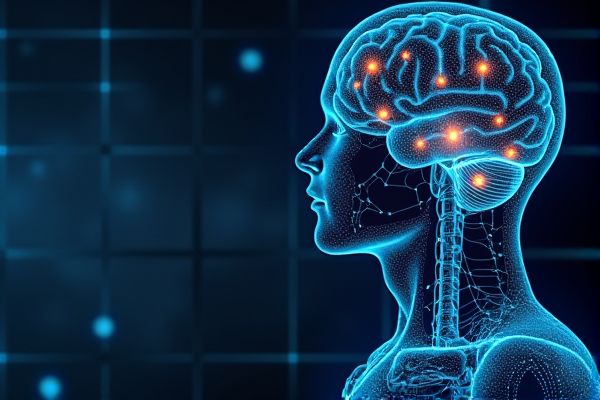
AI enhances Cognitive Behavioral Therapy (CBT) by providing personalized interventions based on user data and behavior patterns. Algorithms analyze patient responses to identify areas requiring attention, ensuring targeted and effective treatment plans. Virtual chatbots and apps offer 24/7 support, allowing individuals to practice coping strategies and monitor their progress outside traditional therapy sessions. Continuous feedback through AI tools fosters engagement, helping users maintain motivation in their mental health journey.
AI usage in cognitive behavioral therapy
Personalization
AI can enhance cognitive behavioral therapy (CBT) through personalization, tailoring treatment plans to individual needs. By analyzing data from patients, such as their responses and behaviors, AI can suggest specific exercises or coping strategies. For instance, a personalized program might recommend techniques from established CBT institutions, like the Beck Institute, to suit a client's unique situation. This level of customization increases the likelihood of better outcomes and patient engagement in the therapeutic process.
Real-time Feedback
AI usage in cognitive behavioral therapy (CBT) can enhance the therapeutic process by providing real-time feedback to clients. This feedback can help individuals identify negative thought patterns and develop more adaptive behaviors. For instance, an AI application designed for mental health support might analyze user input and suggest coping strategies tailored to their specific situations. The integration of AI in CBT presents the possibility of increased accessibility and personalized care for patients seeking mental wellness.
Scalability
AI can enhance the scalability of cognitive behavioral therapy by automating certain processes, such as patient assessments and progress tracking. This technology allows therapists to reach a larger number of clients without compromising the quality of care. For instance, virtual platforms can deliver tailored therapeutic content to users based on their specific needs. Such advancements present opportunities for institutions like mental health clinics to expand their services efficiently.
Emotion Recognition
AI can play a significant role in cognitive behavioral therapy by providing real-time emotion recognition, which enhances the therapeutic process. For instance, platforms like Woebot use AI to analyze users' moods and deliver tailored interventions. This technology may improve patient outcomes by offering personalized feedback and support. The chance of increased accessibility to mental health care could be one of the notable advantages of integrating AI into traditional practices.
Anonymity
AI can enhance cognitive behavioral therapy (CBT) by providing personalized recommendations based on user input and behavior. Anonymity in AI interactions may encourage individuals to engage more openly, potentially leading to better therapeutic outcomes. For instance, a platform like Woebot allows users to access support without the fear of judgment. The chance of improved mental well-being through such tools can be significant, especially for those hesitant to seek traditional therapy.
Progress Tracking
AI can enhance cognitive behavioral therapy (CBT) by providing personalized progress tracking tools. These tools can analyze user data and identify patterns in thought and behavior, allowing therapists to adjust treatment plans as needed. By integrating AI-driven applications like Woebot, patients may experience improved outcomes through consistent monitoring and tailored interventions. The potential for real-time feedback could lead to greater engagement and adherence to therapeutic practices.
Interactive Simulations
AI usage in cognitive behavioral therapy (CBT) can enhance the therapeutic process by providing personalized feedback and real-time analytics. Interactive simulations allow patients to practice coping strategies in a controlled environment, increasing their engagement and retention of techniques. Tools like Woebot have demonstrated potential advantages in offering immediate support and tracking emotional patterns. The integration of AI could lead to more accessible mental health resources, improving outcomes for patients who may not have traditional therapy options.
Language Processing
AI has the potential to enhance cognitive behavioral therapy (CBT) by providing personalized support through language processing. For instance, chatbots can facilitate real-time conversations that mimic therapeutic interactions, offering interventions tailored to individual needs. This technology may increase accessibility for patients who face barriers to traditional therapy, such as location or cost. Incorporating AI tools could improve treatment outcomes and promote engagement in mental health care.
Accessibility
AI has the potential to enhance cognitive behavioral therapy by providing personalized support and interventions. It can analyze user data to identify patterns and offer tailored resources, increasing treatment effectiveness. For example, platforms like Woebot demonstrate how AI can facilitate access to therapeutic techniques anytime. This accessibility may lower barriers for individuals seeking mental health care, expanding the reach of therapy.
Cost-effectiveness
AI integration in cognitive behavioral therapy (CBT) can enhance treatment outcomes by providing personalized interventions. This technology can reduce therapy costs by automating aspects of the therapeutic process and improving access to care. Studies suggest that AI-driven CBT platforms may offer comparable efficacy to traditional methods, making mental health support more accessible. Institutions like Stanford University are exploring these innovative approaches, highlighting the potential benefits of AI in mental health treatment.
 techknowy.com
techknowy.com